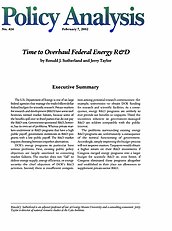The U.S. Department of Energy is one of six large federal agencies that manage the multi-billion-dollar federal budgets for scientific research. Private markets for research and development (R&D) have some inefficiencies, termed market failures, because some of the benefits spill over to third parties that do not pay the R&D cost. Government-sponsored R&D, however, has its own set of problems. Whereas private markets underinvest in R&D programs that have a high public payoff, government overinvests in R&D programs with a low public payoff. The R&D market requires choosing between imperfect alternatives.
DOE’s energy programs in particular have serious problems. First, existing public policy objectives are largely unrelated to correcting market failures. The market does not “fail” to deliver energy supply, energy efficiency, or energy security–the chief objectives of DOE’s R&D activities. Second, there is insufficient competition among potential research communities&–for example, universities–to obtain DOE funding for research and scientific facilities. As a consequence, energy R&D programs are unlikely to ever provide net benefits to taxpayers. Third, the incentives inherent in government-managed R&D are seldom compatible with the public interest.
The problems surrounding existing energy R&D programs are, unfortunately, a consequence of the normal functioning of government. Accordingly, simply improving the budget process will not improve matters. Taxpayers would obtain a higher return on their R&D investments if Congress merged energy programs into a larger budget for scientific R&D or, even better, if Congress eliminated those programs altogether and established in their place tax allowances to supplement private-sector R&D.
About the Authors

This work is licensed under a Creative Commons Attribution-NonCommercial-ShareAlike 4.0 International License.
